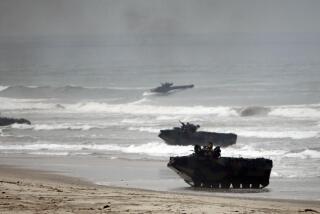Marine Boxing Tourney Halted Pending Inquiry Into Injury to Recruit
- Share via
The commander of the Marine Corps Recruit Depot on Wednesday suspended boxing matches until an investigation of a critical injury suffered by an 18-year-old private during an informal boxing tournament Sunday is completed.
Maj. Gen. Donald J. Fulham issued the order, reversing his decision Monday to continue the bouts despite the brain injury suffered by Pvt. Paul Resce in the third round of a boxing match with another Marine at the depot.
Fulham banned the bouts after realizing that the investigation would not yield sufficient information to review the situation again before the next scheduled matches Sunday, said Maj. Jerry Broeckert, a Marine Corps spokesman.
The 5-foot-9, 170-pound Resce remains in critical condition at the Balboa Park Naval Hospital with a subdural hematoma. He is being maintained on a life support system.
Prognosis Poor
“His prognosis is poor,” said Maj. Jerry Broeckert, a Marine Corps spokesman.
Fulham has ordered Lt. Col. Kenneth Sandstrom to conduct an inquiry into the circumstances surrounding Resce’s injury and the safety procedures governing the “boxing smokers” held nearly every week between recruits in classes nearing graduation.
The tournaments, nicknamed for the smoke-filled rooms where some prizefights traditionally are held, are intended “to develop self-confidence and courage and instill individual and unit pride within the recruit,” Broeckert said.
The fights are suspended until Sandstrom completes his 30-day investigation, which will include taking 300 statements from witnesses, Broeckert said. On Monday, however, he had decided to let the matches continue after a preliminary review.
Suffer Heat Stroke
“We have Marines every now and then that suffer heat exhaustion and heat stroke as well. We don’t stop running,” Broeckert said early Wednesday afternoon. “We’ve been doing this for many years and feel that the program is fundamentally sound.”
Resce’s father, reached by telephone at the intensive care waiting room at the Naval Hospital, agreed to answer a reporter’s questions about his son’s injuries. But Maj. Stephen Cheney, the recruit depot’s liaison to the family, intervened and said that Resce did not want to answer questions.
Broeckert said that Resce’s parents had left instructions that they did not want to be contacted by the media.
During the third round of his fight Sunday afternoon, Resce took a blow to the head, lost his balance and began to fall backward before he collapsed in the arms of the referee, Broeckert said. The unconscious Marine was given first aid until an ambulance arrived. Shortly after the 3:15 p.m. incident, he was rushed to the Naval Hospital, where he remains.
Three-Round Bouts
Broeckert said that stringent safety procedures govern the three-round bouts, which are held during the 10th week of the recruits’ 11-week training program at the depot. Each round lasts two minutes with a minute’s rest between rounds.
The fighters are volunteers, and no man is permitted more than a 10-pound weight advanatage or a six-inch reach advantage, Broeckert said. Fighters wear headgear and are prohibited from taking part if they have a history of head injuries or cannot see well without contact lenses or glasses. A fight is terminated in the event of a knockdown or cut.
Despite such safeguards, opponents of boxing include the American Medical Assn., which has dedicated itself to “the elimination of both amateur and professional boxing, a sport in which the primary objective is to inflict injury,” according to a spokeswoman in the AMA’s Chicago headquarters.
‘All Futile’
“The point of this is that no matter what safety procedures are put in place, they are all futile,” said Dr. George Lundberg, editor of the Journal of the American Medical Assn., and the association’s expert on boxing damage. “The only two safety procedures that will work are, No. 1, banning boxing, and No. 2, banning blows to the head.
“Blows to the head damage the brain, and it doesn’t matter whether you’re experienced, inexperienced, (boxing) for fun or for pay,” Lundberg said.
In 1985, a New Jersey commission recommended the abolition of professional boxing in that state, calling the sport “one-on-one brutality” that “has no place in a civilized culture.”
Broeckert said he did not know of any other such incidents or how long the recruit depot has been holding boxing tournaments. He said the “smokers” have a long tradition in other branches of military as well.
In 1976, 20-year-old Pvt. Lynn E. McClure died after being hit on the head with a pugil stick--a large padded stave used in bayonet training--as part of close-combat training at the recruit depot.
More to Read
Go beyond the scoreboard
Get the latest on L.A.'s teams in the daily Sports Report newsletter.
You may occasionally receive promotional content from the Los Angeles Times.










